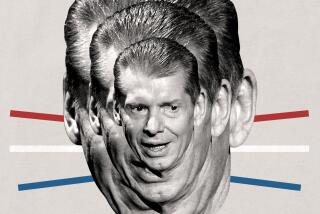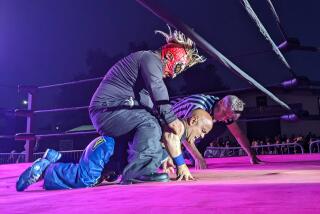Wrestling for Funds Frustrates Cossarek : High school: Westminster coach says budget cuts, bureaucracy and dwindling numbers might prompt him to quit after 35 seasons.
- Share via
WESTMINSTER — Bob Cossarek wasn’t quite sure what wrestling was back in the mid-1950s, but he knew instantly that he loved it.
Equipment was often impossible to find. Training methods were passed on by word of mouth. Technique usually lost out to brute strength. Coaches and wrestlers in those days simply adapted and improvised.
Times have changed, but Cossarek has found new, more frustrating barriers in his path.
Mats are safer, but coaches must raise money to buy new ones because school districts are broke.
Uniforms are made of stylish, state-of-the-art materials, but there seem to be fewer kids to fill them. Some potential wrestlers simply can’t afford to pay to play.
Those who do wrestle are more talented and better coached, but there are few college scholarship opportunities left.
After 35 seasons of coaching what he calls “the world’s greatest sport,” Cossarek is thinking of quitting. Too many budget cuts. Too much bureaucracy. Too much frustration.
“Wrestling is a young man’s sport to coach,” Cossarek said. “I probably should have got out a long time ago.”
But he couldn’t. He wouldn’t. The time was never right. There was no one else around who could coach the team. So Cossarek stuck around 35 seasons, the last 24 at Westminster, where the teams have always been good but never great.
Over the years, Westminster has won seven Sunset League championships. The last two seasons, the Lions have finished second behind Huntington Beach. If winning was all Cossarek cared about he probably would have quit coaching a long time ago.
The fact is Cossarek, 58, loves the kids as much as he loves the sport. That’s why he teaches U.S. history, government and economics with limited English skills. That’s why he’s still coaching. Kids matter.
“The kids I have are great kids,” he said. “They work hard. They’re funny. They seem to enjoy each other.”
Little has changed on that front. It takes a special breed to wrestle. Always has.
“It’s such a grueling sport,” Cossarek said. “You get so unbelievably tired and there’s no rest. You can’t blame anybody but yourself. You can’t blame the referees. Oh, once in a while you’ll get a bad call.”
If Cossarek could limit the experience to the wrestling itself, he’d be happy. After all, it was the simplicity of the sport that hooked him when he was a student at UC Santa Barbara.
One physical education class was all it took. The instructor was named Jack Fernandez, who went on to coach at Manhattan Beach Mira Costa. Like Fernandez, Cossarek wanted to be a high school coach.
Only a handful of high schools had wrestling teams in the ‘50s, and when Cossarek heard that Compton Dominguez had an opening for a football and wrestling coach, he jumped at the chance. Dominguez was a new school and it offered Cossarek the chance to start something all his own.
He was there from 1958-68, introducing wrestling to an eager audience. Oh, the kids were great, Cossarek said, but putting together a suitable mat was a chore. So was finding a place to put the mat. So was finding uniforms and shoes.
Those were the days.
Cossarek put 5-foot by 10-foot mats together, then covered them with tarp. At Dominguez, they held practice in the cafeteria or in the auto shop--whichever was available. Only in the 1960s did they begin building wrestling rooms in new schools.
Wrestlers wore long tights that made them look more like gymnasts. Most wrestled in canvas high-top sneakers. The officials wore all-white uniforms and were derisively called milk men.
“The first Japanese shoe came out in the mid-1960s,” Cossarek said. “It fell apart in about three weeks. Once, I tried to buy an old leather shoe--an old boxing shoe--and the sporting goods salesman had to get out his catalogue to order it.”
When Cossarek moved to Westminster, he began the battle all over again.
“We’ve never been bad, but the league has been very, very competitive,” he said.
Westminster’s first big rival was Western, then came Loara, Fountain Valley and Edison. Now, it’s Huntington Beach.
As the seasons have passed, Cossarek has seen many of his contemporaries leave the coaching ranks to become officials. It’s easier. No budget cuts. No fund-raising. No recruiting.
“When I first came here we used to get over 100 kids out,” Cossarek said. “I really tried to do a job on recruiting. Apparently, it didn’t have any effect.”
This season, only 25 wrestlers turned out.
“I’ve always had at least 40,” Cossarek said. “This is the first time ever without a junior varsity team. It’s just frosh-soph and varsity.”
Money is a big problem. Some would-be wrestlers come from families with limited incomes, who simply can’t afford the school’s transportation and participation fees.
Cossarek handled making a mat from scratch, or buying equipment from a catalogue, but the money battles have been most disturbing.
Unfortunately, he doesn’t have an answer.
As long as he’s fighting, though, Westminster’s wrestling team will benefit. Love dies hard.
More to Read
Get our high school sports newsletter
Prep Rally is devoted to the SoCal high school sports experience, bringing you scores, stories and a behind-the-scenes look at what makes prep sports so popular.
You may occasionally receive promotional content from the Los Angeles Times.






